Communication and Diversity: Personal Biases Towards Aboriginal People
VerifiedAdded on 2023/06/10
|9
|2216
|283
Homework Assignment
AI Summary
This assignment delves into the student's personal biases and prejudices towards Aboriginal people, prompted by a visualization exercise and reflection on a real-life encounter. The student initially formed negative assumptions about an Aboriginal man based on stereotypes, but later learned about his positive contributions to the community. The assignment explores how these biases were shaped by mainstream media portrayals and a lack of personal interaction with Aboriginal people. It examines the impact of these biases on decision-making, particularly in healthcare, where cultural insensitivity can lead to disparities in health outcomes. The assignment emphasizes the importance of cultural competency and sensitivity in healthcare professionals and advocates for removing biases to ensure equitable health and well-being for all individuals. It references various academic sources to support its arguments, covering topics such as media influence, stereotypes, and the importance of cultural understanding in promoting effective communication and reducing prejudice.
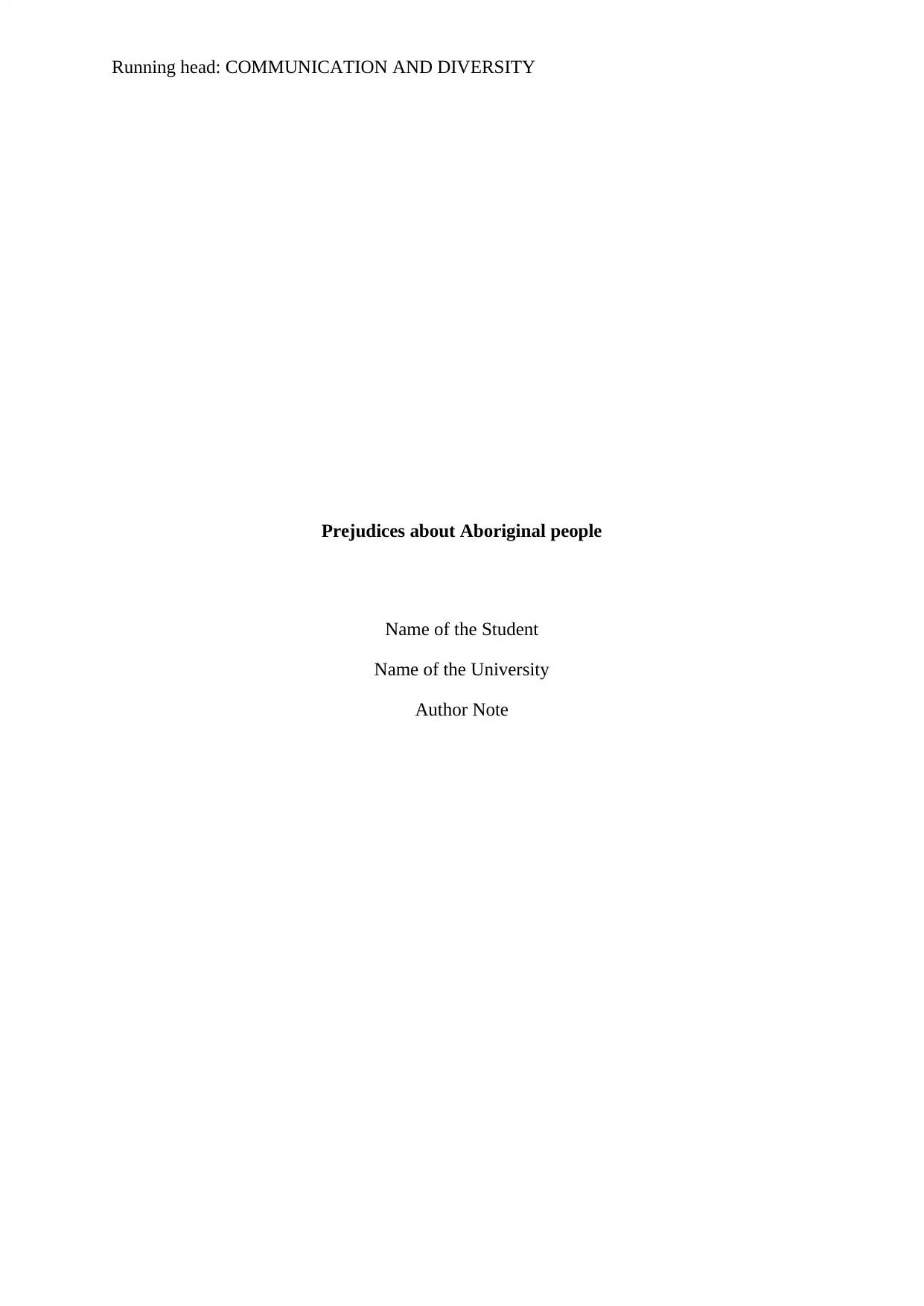
Running head: COMMUNICATION AND DIVERSITY
Prejudices about Aboriginal people
Name of the Student
Name of the University
Author Note
Prejudices about Aboriginal people
Name of the Student
Name of the University
Author Note
Paraphrase This Document
Need a fresh take? Get an instant paraphrase of this document with our AI Paraphraser
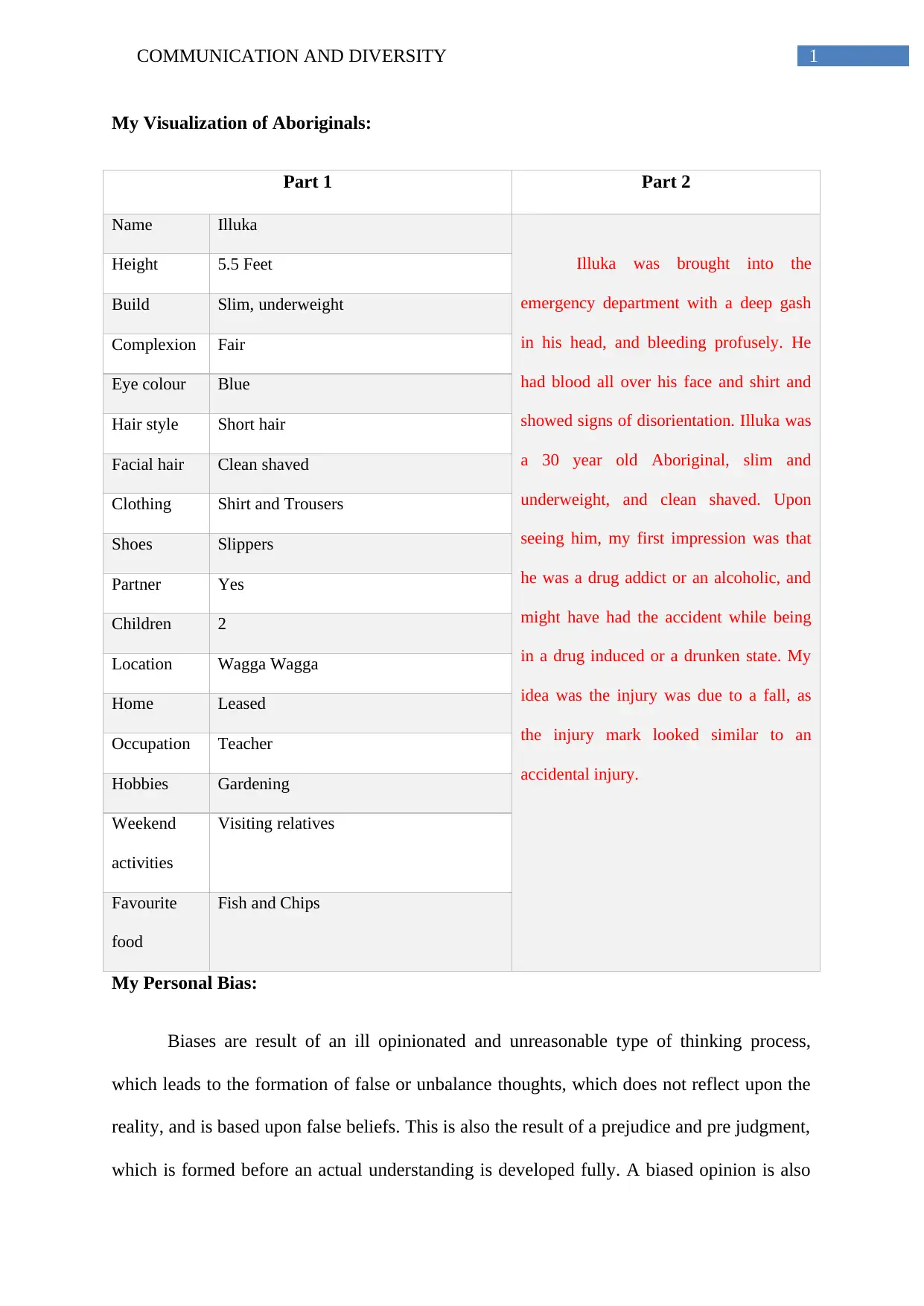
1COMMUNICATION AND DIVERSITY
My Visualization of Aboriginals:
Part 1 Part 2
Name Illuka
Illuka was brought into the
emergency department with a deep gash
in his head, and bleeding profusely. He
had blood all over his face and shirt and
showed signs of disorientation. Illuka was
a 30 year old Aboriginal, slim and
underweight, and clean shaved. Upon
seeing him, my first impression was that
he was a drug addict or an alcoholic, and
might have had the accident while being
in a drug induced or a drunken state. My
idea was the injury was due to a fall, as
the injury mark looked similar to an
accidental injury.
Height 5.5 Feet
Build Slim, underweight
Complexion Fair
Eye colour Blue
Hair style Short hair
Facial hair Clean shaved
Clothing Shirt and Trousers
Shoes Slippers
Partner Yes
Children 2
Location Wagga Wagga
Home Leased
Occupation Teacher
Hobbies Gardening
Weekend
activities
Visiting relatives
Favourite
food
Fish and Chips
My Personal Bias:
Biases are result of an ill opinionated and unreasonable type of thinking process,
which leads to the formation of false or unbalance thoughts, which does not reflect upon the
reality, and is based upon false beliefs. This is also the result of a prejudice and pre judgment,
which is formed before an actual understanding is developed fully. A biased opinion is also
My Visualization of Aboriginals:
Part 1 Part 2
Name Illuka
Illuka was brought into the
emergency department with a deep gash
in his head, and bleeding profusely. He
had blood all over his face and shirt and
showed signs of disorientation. Illuka was
a 30 year old Aboriginal, slim and
underweight, and clean shaved. Upon
seeing him, my first impression was that
he was a drug addict or an alcoholic, and
might have had the accident while being
in a drug induced or a drunken state. My
idea was the injury was due to a fall, as
the injury mark looked similar to an
accidental injury.
Height 5.5 Feet
Build Slim, underweight
Complexion Fair
Eye colour Blue
Hair style Short hair
Facial hair Clean shaved
Clothing Shirt and Trousers
Shoes Slippers
Partner Yes
Children 2
Location Wagga Wagga
Home Leased
Occupation Teacher
Hobbies Gardening
Weekend
activities
Visiting relatives
Favourite
food
Fish and Chips
My Personal Bias:
Biases are result of an ill opinionated and unreasonable type of thinking process,
which leads to the formation of false or unbalance thoughts, which does not reflect upon the
reality, and is based upon false beliefs. This is also the result of a prejudice and pre judgment,
which is formed before an actual understanding is developed fully. A biased opinion is also
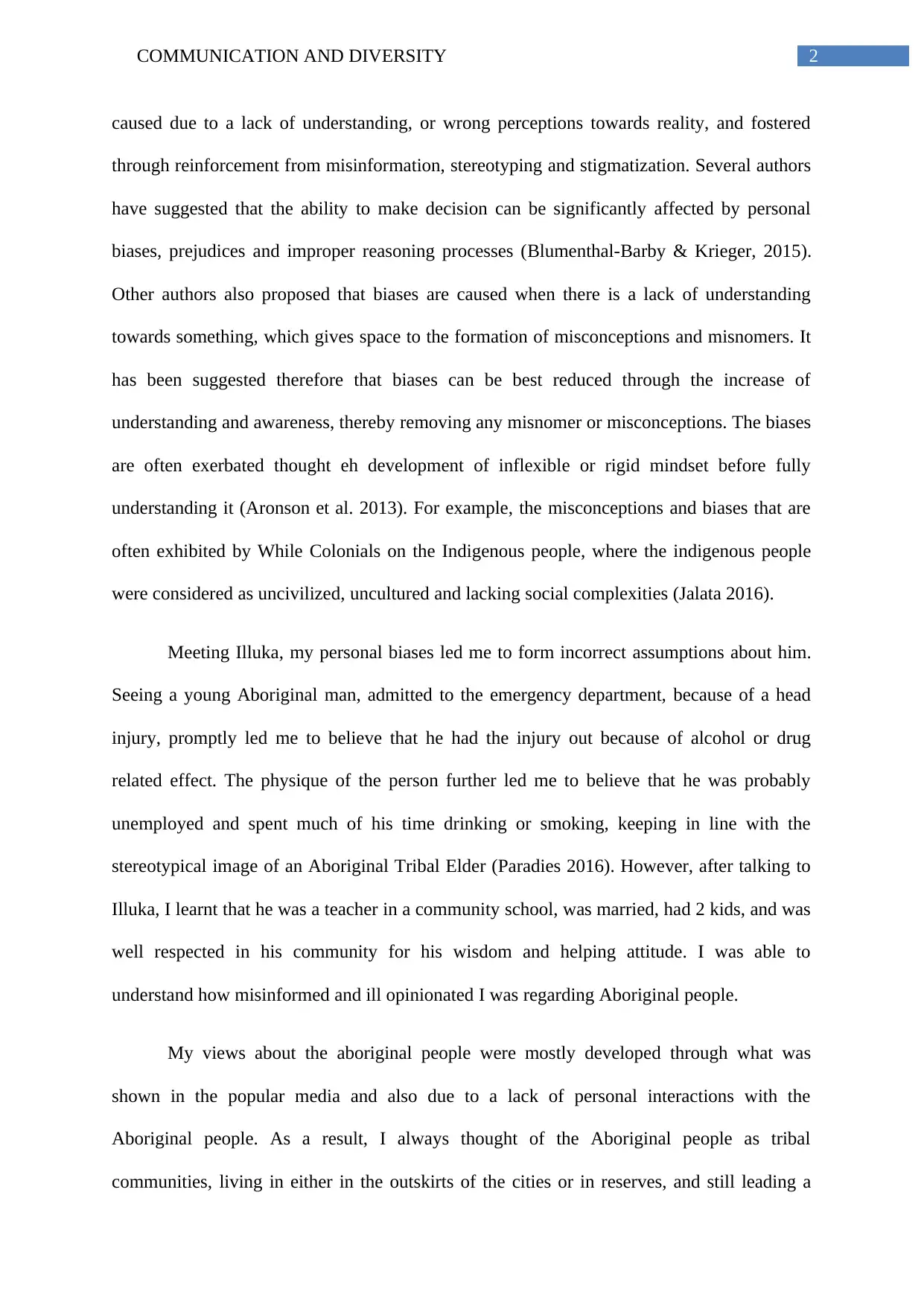
2COMMUNICATION AND DIVERSITY
caused due to a lack of understanding, or wrong perceptions towards reality, and fostered
through reinforcement from misinformation, stereotyping and stigmatization. Several authors
have suggested that the ability to make decision can be significantly affected by personal
biases, prejudices and improper reasoning processes (Blumenthal-Barby & Krieger, 2015).
Other authors also proposed that biases are caused when there is a lack of understanding
towards something, which gives space to the formation of misconceptions and misnomers. It
has been suggested therefore that biases can be best reduced through the increase of
understanding and awareness, thereby removing any misnomer or misconceptions. The biases
are often exerbated thought eh development of inflexible or rigid mindset before fully
understanding it (Aronson et al. 2013). For example, the misconceptions and biases that are
often exhibited by While Colonials on the Indigenous people, where the indigenous people
were considered as uncivilized, uncultured and lacking social complexities (Jalata 2016).
Meeting Illuka, my personal biases led me to form incorrect assumptions about him.
Seeing a young Aboriginal man, admitted to the emergency department, because of a head
injury, promptly led me to believe that he had the injury out because of alcohol or drug
related effect. The physique of the person further led me to believe that he was probably
unemployed and spent much of his time drinking or smoking, keeping in line with the
stereotypical image of an Aboriginal Tribal Elder (Paradies 2016). However, after talking to
Illuka, I learnt that he was a teacher in a community school, was married, had 2 kids, and was
well respected in his community for his wisdom and helping attitude. I was able to
understand how misinformed and ill opinionated I was regarding Aboriginal people.
My views about the aboriginal people were mostly developed through what was
shown in the popular media and also due to a lack of personal interactions with the
Aboriginal people. As a result, I always thought of the Aboriginal people as tribal
communities, living in either in the outskirts of the cities or in reserves, and still leading a
caused due to a lack of understanding, or wrong perceptions towards reality, and fostered
through reinforcement from misinformation, stereotyping and stigmatization. Several authors
have suggested that the ability to make decision can be significantly affected by personal
biases, prejudices and improper reasoning processes (Blumenthal-Barby & Krieger, 2015).
Other authors also proposed that biases are caused when there is a lack of understanding
towards something, which gives space to the formation of misconceptions and misnomers. It
has been suggested therefore that biases can be best reduced through the increase of
understanding and awareness, thereby removing any misnomer or misconceptions. The biases
are often exerbated thought eh development of inflexible or rigid mindset before fully
understanding it (Aronson et al. 2013). For example, the misconceptions and biases that are
often exhibited by While Colonials on the Indigenous people, where the indigenous people
were considered as uncivilized, uncultured and lacking social complexities (Jalata 2016).
Meeting Illuka, my personal biases led me to form incorrect assumptions about him.
Seeing a young Aboriginal man, admitted to the emergency department, because of a head
injury, promptly led me to believe that he had the injury out because of alcohol or drug
related effect. The physique of the person further led me to believe that he was probably
unemployed and spent much of his time drinking or smoking, keeping in line with the
stereotypical image of an Aboriginal Tribal Elder (Paradies 2016). However, after talking to
Illuka, I learnt that he was a teacher in a community school, was married, had 2 kids, and was
well respected in his community for his wisdom and helping attitude. I was able to
understand how misinformed and ill opinionated I was regarding Aboriginal people.
My views about the aboriginal people were mostly developed through what was
shown in the popular media and also due to a lack of personal interactions with the
Aboriginal people. As a result, I always thought of the Aboriginal people as tribal
communities, living in either in the outskirts of the cities or in reserves, and still leading a
⊘ This is a preview!⊘
Do you want full access?
Subscribe today to unlock all pages.

Trusted by 1+ million students worldwide
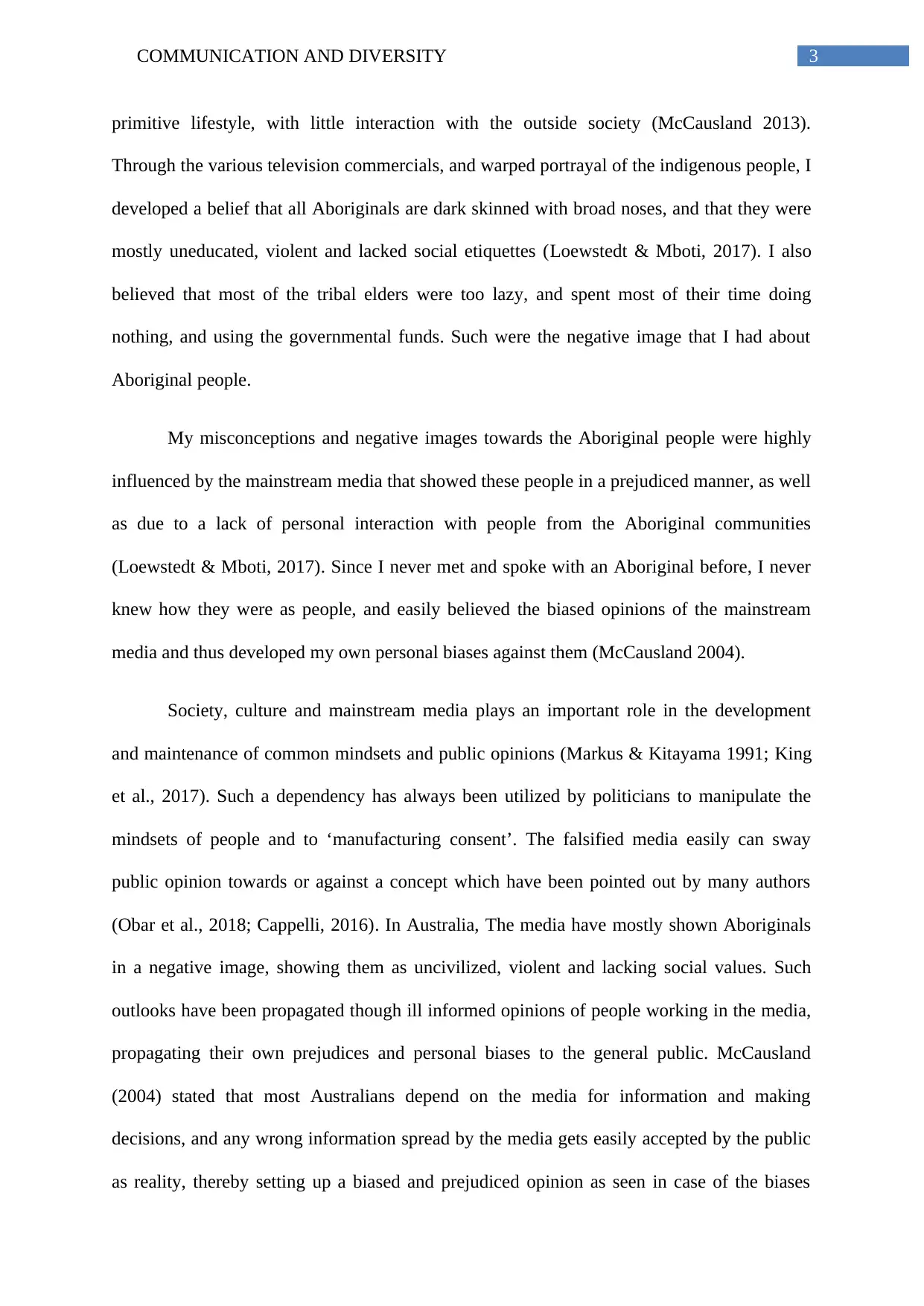
3COMMUNICATION AND DIVERSITY
primitive lifestyle, with little interaction with the outside society (McCausland 2013).
Through the various television commercials, and warped portrayal of the indigenous people, I
developed a belief that all Aboriginals are dark skinned with broad noses, and that they were
mostly uneducated, violent and lacked social etiquettes (Loewstedt & Mboti, 2017). I also
believed that most of the tribal elders were too lazy, and spent most of their time doing
nothing, and using the governmental funds. Such were the negative image that I had about
Aboriginal people.
My misconceptions and negative images towards the Aboriginal people were highly
influenced by the mainstream media that showed these people in a prejudiced manner, as well
as due to a lack of personal interaction with people from the Aboriginal communities
(Loewstedt & Mboti, 2017). Since I never met and spoke with an Aboriginal before, I never
knew how they were as people, and easily believed the biased opinions of the mainstream
media and thus developed my own personal biases against them (McCausland 2004).
Society, culture and mainstream media plays an important role in the development
and maintenance of common mindsets and public opinions (Markus & Kitayama 1991; King
et al., 2017). Such a dependency has always been utilized by politicians to manipulate the
mindsets of people and to ‘manufacturing consent’. The falsified media easily can sway
public opinion towards or against a concept which have been pointed out by many authors
(Obar et al., 2018; Cappelli, 2016). In Australia, The media have mostly shown Aboriginals
in a negative image, showing them as uncivilized, violent and lacking social values. Such
outlooks have been propagated though ill informed opinions of people working in the media,
propagating their own prejudices and personal biases to the general public. McCausland
(2004) stated that most Australians depend on the media for information and making
decisions, and any wrong information spread by the media gets easily accepted by the public
as reality, thereby setting up a biased and prejudiced opinion as seen in case of the biases
primitive lifestyle, with little interaction with the outside society (McCausland 2013).
Through the various television commercials, and warped portrayal of the indigenous people, I
developed a belief that all Aboriginals are dark skinned with broad noses, and that they were
mostly uneducated, violent and lacked social etiquettes (Loewstedt & Mboti, 2017). I also
believed that most of the tribal elders were too lazy, and spent most of their time doing
nothing, and using the governmental funds. Such were the negative image that I had about
Aboriginal people.
My misconceptions and negative images towards the Aboriginal people were highly
influenced by the mainstream media that showed these people in a prejudiced manner, as well
as due to a lack of personal interaction with people from the Aboriginal communities
(Loewstedt & Mboti, 2017). Since I never met and spoke with an Aboriginal before, I never
knew how they were as people, and easily believed the biased opinions of the mainstream
media and thus developed my own personal biases against them (McCausland 2004).
Society, culture and mainstream media plays an important role in the development
and maintenance of common mindsets and public opinions (Markus & Kitayama 1991; King
et al., 2017). Such a dependency has always been utilized by politicians to manipulate the
mindsets of people and to ‘manufacturing consent’. The falsified media easily can sway
public opinion towards or against a concept which have been pointed out by many authors
(Obar et al., 2018; Cappelli, 2016). In Australia, The media have mostly shown Aboriginals
in a negative image, showing them as uncivilized, violent and lacking social values. Such
outlooks have been propagated though ill informed opinions of people working in the media,
propagating their own prejudices and personal biases to the general public. McCausland
(2004) stated that most Australians depend on the media for information and making
decisions, and any wrong information spread by the media gets easily accepted by the public
as reality, thereby setting up a biased and prejudiced opinion as seen in case of the biases
Paraphrase This Document
Need a fresh take? Get an instant paraphrase of this document with our AI Paraphraser
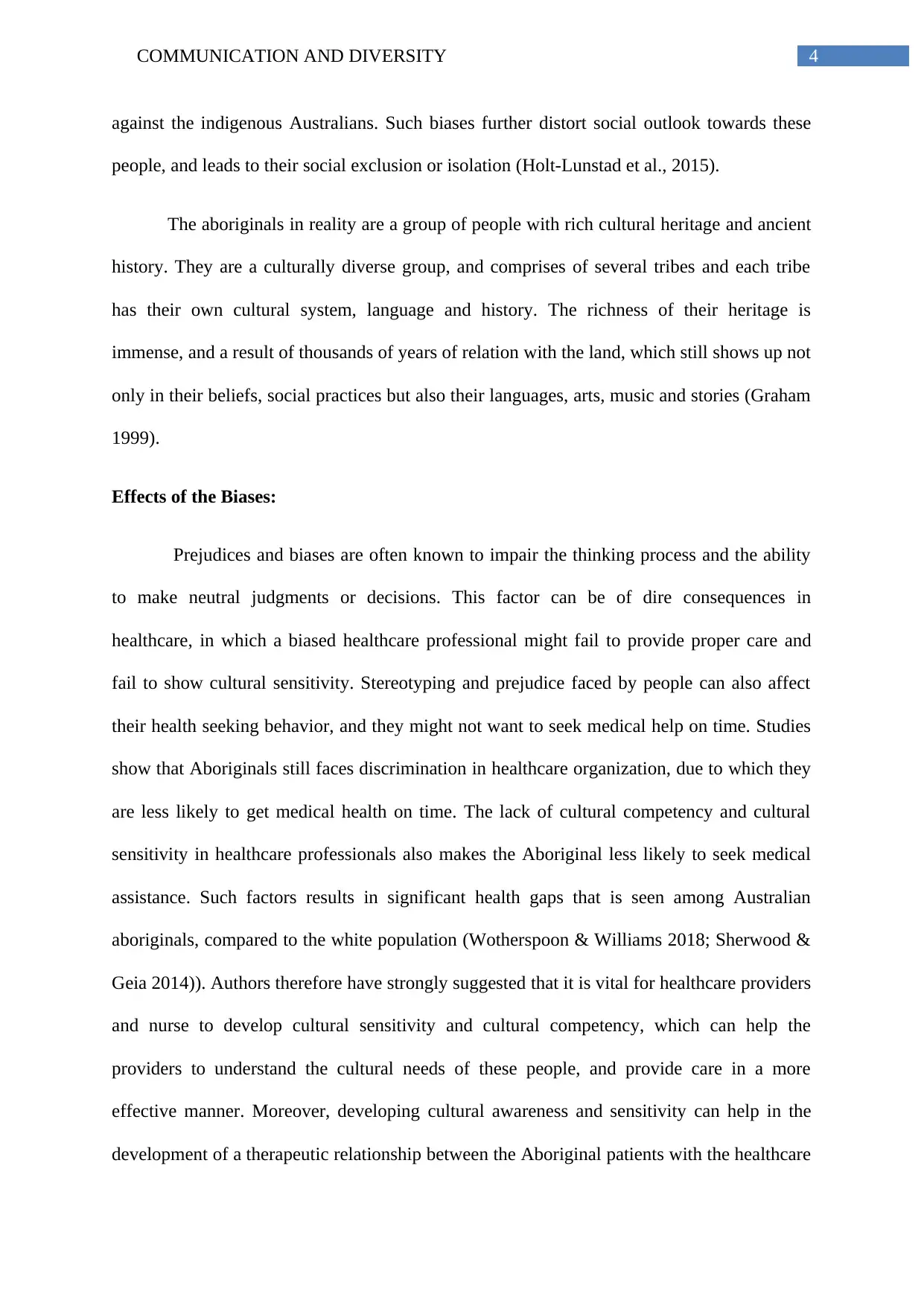
4COMMUNICATION AND DIVERSITY
against the indigenous Australians. Such biases further distort social outlook towards these
people, and leads to their social exclusion or isolation (Holt-Lunstad et al., 2015).
The aboriginals in reality are a group of people with rich cultural heritage and ancient
history. They are a culturally diverse group, and comprises of several tribes and each tribe
has their own cultural system, language and history. The richness of their heritage is
immense, and a result of thousands of years of relation with the land, which still shows up not
only in their beliefs, social practices but also their languages, arts, music and stories (Graham
1999).
Effects of the Biases:
Prejudices and biases are often known to impair the thinking process and the ability
to make neutral judgments or decisions. This factor can be of dire consequences in
healthcare, in which a biased healthcare professional might fail to provide proper care and
fail to show cultural sensitivity. Stereotyping and prejudice faced by people can also affect
their health seeking behavior, and they might not want to seek medical help on time. Studies
show that Aboriginals still faces discrimination in healthcare organization, due to which they
are less likely to get medical health on time. The lack of cultural competency and cultural
sensitivity in healthcare professionals also makes the Aboriginal less likely to seek medical
assistance. Such factors results in significant health gaps that is seen among Australian
aboriginals, compared to the white population (Wotherspoon & Williams 2018; Sherwood &
Geia 2014)). Authors therefore have strongly suggested that it is vital for healthcare providers
and nurse to develop cultural sensitivity and cultural competency, which can help the
providers to understand the cultural needs of these people, and provide care in a more
effective manner. Moreover, developing cultural awareness and sensitivity can help in the
development of a therapeutic relationship between the Aboriginal patients with the healthcare
against the indigenous Australians. Such biases further distort social outlook towards these
people, and leads to their social exclusion or isolation (Holt-Lunstad et al., 2015).
The aboriginals in reality are a group of people with rich cultural heritage and ancient
history. They are a culturally diverse group, and comprises of several tribes and each tribe
has their own cultural system, language and history. The richness of their heritage is
immense, and a result of thousands of years of relation with the land, which still shows up not
only in their beliefs, social practices but also their languages, arts, music and stories (Graham
1999).
Effects of the Biases:
Prejudices and biases are often known to impair the thinking process and the ability
to make neutral judgments or decisions. This factor can be of dire consequences in
healthcare, in which a biased healthcare professional might fail to provide proper care and
fail to show cultural sensitivity. Stereotyping and prejudice faced by people can also affect
their health seeking behavior, and they might not want to seek medical help on time. Studies
show that Aboriginals still faces discrimination in healthcare organization, due to which they
are less likely to get medical health on time. The lack of cultural competency and cultural
sensitivity in healthcare professionals also makes the Aboriginal less likely to seek medical
assistance. Such factors results in significant health gaps that is seen among Australian
aboriginals, compared to the white population (Wotherspoon & Williams 2018; Sherwood &
Geia 2014)). Authors therefore have strongly suggested that it is vital for healthcare providers
and nurse to develop cultural sensitivity and cultural competency, which can help the
providers to understand the cultural needs of these people, and provide care in a more
effective manner. Moreover, developing cultural awareness and sensitivity can help in the
development of a therapeutic relationship between the Aboriginal patients with the healthcare
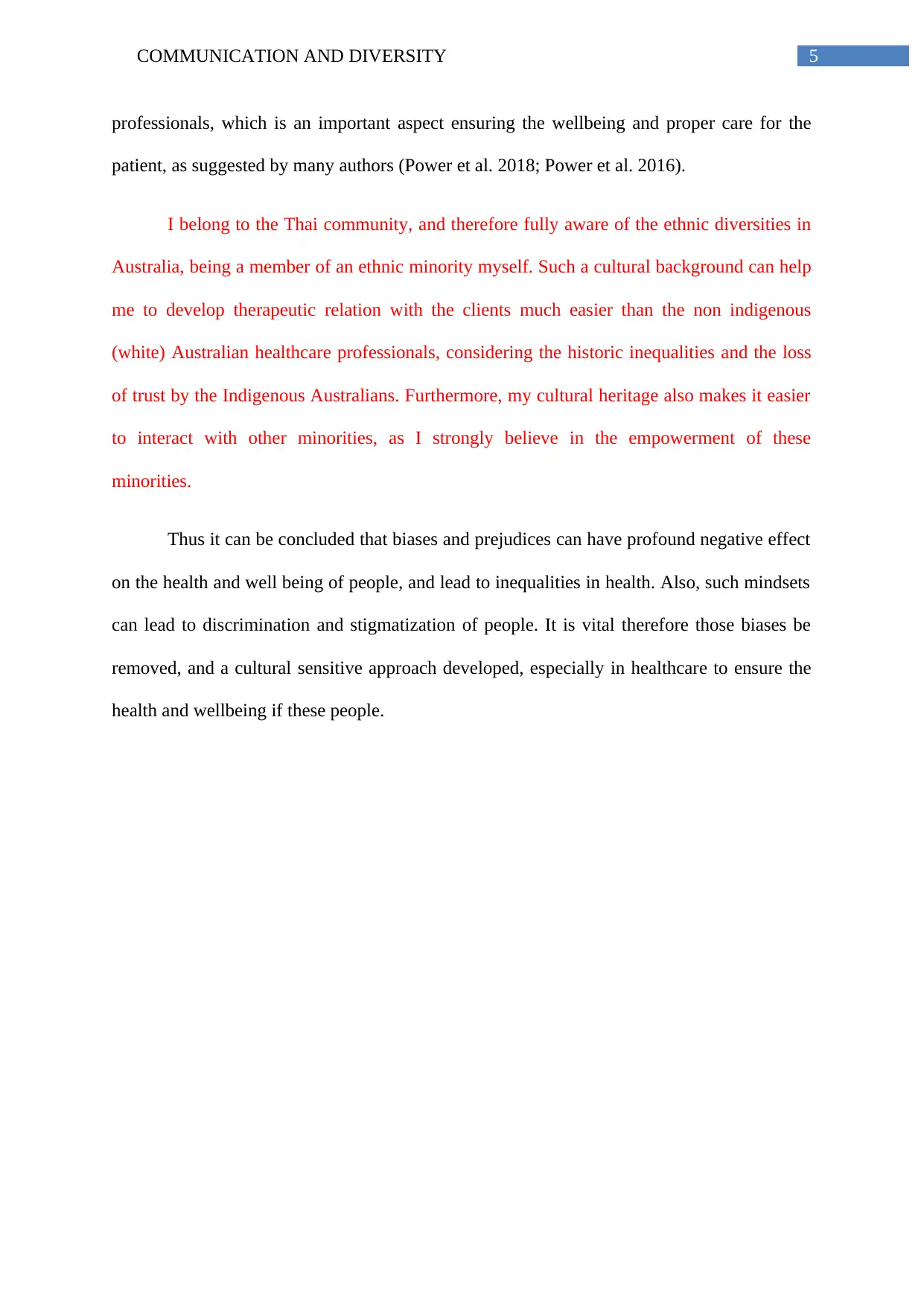
5COMMUNICATION AND DIVERSITY
professionals, which is an important aspect ensuring the wellbeing and proper care for the
patient, as suggested by many authors (Power et al. 2018; Power et al. 2016).
I belong to the Thai community, and therefore fully aware of the ethnic diversities in
Australia, being a member of an ethnic minority myself. Such a cultural background can help
me to develop therapeutic relation with the clients much easier than the non indigenous
(white) Australian healthcare professionals, considering the historic inequalities and the loss
of trust by the Indigenous Australians. Furthermore, my cultural heritage also makes it easier
to interact with other minorities, as I strongly believe in the empowerment of these
minorities.
Thus it can be concluded that biases and prejudices can have profound negative effect
on the health and well being of people, and lead to inequalities in health. Also, such mindsets
can lead to discrimination and stigmatization of people. It is vital therefore those biases be
removed, and a cultural sensitive approach developed, especially in healthcare to ensure the
health and wellbeing if these people.
professionals, which is an important aspect ensuring the wellbeing and proper care for the
patient, as suggested by many authors (Power et al. 2018; Power et al. 2016).
I belong to the Thai community, and therefore fully aware of the ethnic diversities in
Australia, being a member of an ethnic minority myself. Such a cultural background can help
me to develop therapeutic relation with the clients much easier than the non indigenous
(white) Australian healthcare professionals, considering the historic inequalities and the loss
of trust by the Indigenous Australians. Furthermore, my cultural heritage also makes it easier
to interact with other minorities, as I strongly believe in the empowerment of these
minorities.
Thus it can be concluded that biases and prejudices can have profound negative effect
on the health and well being of people, and lead to inequalities in health. Also, such mindsets
can lead to discrimination and stigmatization of people. It is vital therefore those biases be
removed, and a cultural sensitive approach developed, especially in healthcare to ensure the
health and wellbeing if these people.
⊘ This is a preview!⊘
Do you want full access?
Subscribe today to unlock all pages.

Trusted by 1+ million students worldwide
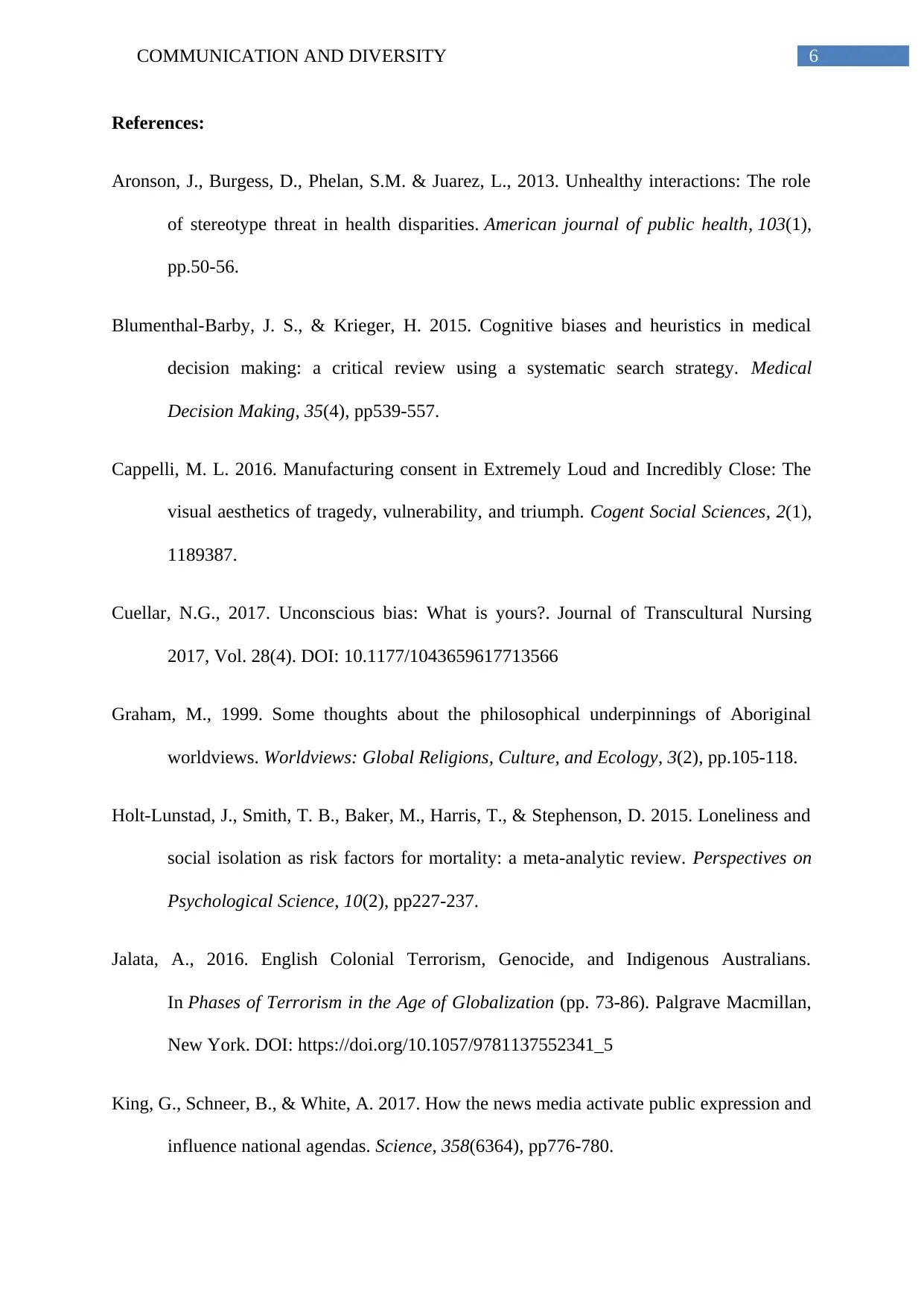
6COMMUNICATION AND DIVERSITY
References:
Aronson, J., Burgess, D., Phelan, S.M. & Juarez, L., 2013. Unhealthy interactions: The role
of stereotype threat in health disparities. American journal of public health, 103(1),
pp.50-56.
Blumenthal-Barby, J. S., & Krieger, H. 2015. Cognitive biases and heuristics in medical
decision making: a critical review using a systematic search strategy. Medical
Decision Making, 35(4), pp539-557.
Cappelli, M. L. 2016. Manufacturing consent in Extremely Loud and Incredibly Close: The
visual aesthetics of tragedy, vulnerability, and triumph. Cogent Social Sciences, 2(1),
1189387.
Cuellar, N.G., 2017. Unconscious bias: What is yours?. Journal of Transcultural Nursing
2017, Vol. 28(4). DOI: 10.1177/1043659617713566
Graham, M., 1999. Some thoughts about the philosophical underpinnings of Aboriginal
worldviews. Worldviews: Global Religions, Culture, and Ecology, 3(2), pp.105-118.
Holt-Lunstad, J., Smith, T. B., Baker, M., Harris, T., & Stephenson, D. 2015. Loneliness and
social isolation as risk factors for mortality: a meta-analytic review. Perspectives on
Psychological Science, 10(2), pp227-237.
Jalata, A., 2016. English Colonial Terrorism, Genocide, and Indigenous Australians.
In Phases of Terrorism in the Age of Globalization (pp. 73-86). Palgrave Macmillan,
New York. DOI: https://doi.org/10.1057/9781137552341_5
King, G., Schneer, B., & White, A. 2017. How the news media activate public expression and
influence national agendas. Science, 358(6364), pp776-780.
References:
Aronson, J., Burgess, D., Phelan, S.M. & Juarez, L., 2013. Unhealthy interactions: The role
of stereotype threat in health disparities. American journal of public health, 103(1),
pp.50-56.
Blumenthal-Barby, J. S., & Krieger, H. 2015. Cognitive biases and heuristics in medical
decision making: a critical review using a systematic search strategy. Medical
Decision Making, 35(4), pp539-557.
Cappelli, M. L. 2016. Manufacturing consent in Extremely Loud and Incredibly Close: The
visual aesthetics of tragedy, vulnerability, and triumph. Cogent Social Sciences, 2(1),
1189387.
Cuellar, N.G., 2017. Unconscious bias: What is yours?. Journal of Transcultural Nursing
2017, Vol. 28(4). DOI: 10.1177/1043659617713566
Graham, M., 1999. Some thoughts about the philosophical underpinnings of Aboriginal
worldviews. Worldviews: Global Religions, Culture, and Ecology, 3(2), pp.105-118.
Holt-Lunstad, J., Smith, T. B., Baker, M., Harris, T., & Stephenson, D. 2015. Loneliness and
social isolation as risk factors for mortality: a meta-analytic review. Perspectives on
Psychological Science, 10(2), pp227-237.
Jalata, A., 2016. English Colonial Terrorism, Genocide, and Indigenous Australians.
In Phases of Terrorism in the Age of Globalization (pp. 73-86). Palgrave Macmillan,
New York. DOI: https://doi.org/10.1057/9781137552341_5
King, G., Schneer, B., & White, A. 2017. How the news media activate public expression and
influence national agendas. Science, 358(6364), pp776-780.
Paraphrase This Document
Need a fresh take? Get an instant paraphrase of this document with our AI Paraphraser
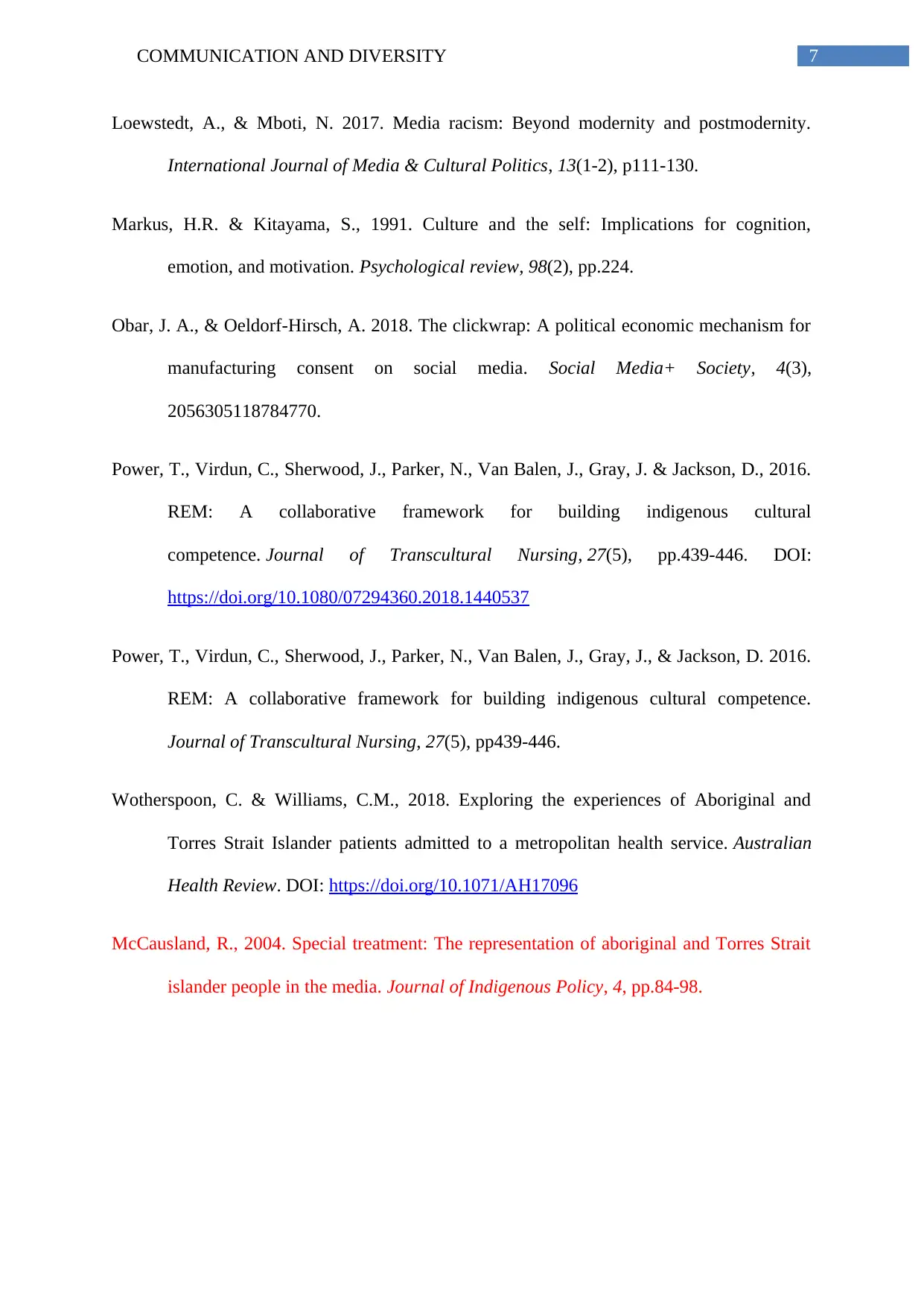
7COMMUNICATION AND DIVERSITY
Loewstedt, A., & Mboti, N. 2017. Media racism: Beyond modernity and postmodernity.
International Journal of Media & Cultural Politics, 13(1-2), p111-130.
Markus, H.R. & Kitayama, S., 1991. Culture and the self: Implications for cognition,
emotion, and motivation. Psychological review, 98(2), pp.224.
Obar, J. A., & Oeldorf-Hirsch, A. 2018. The clickwrap: A political economic mechanism for
manufacturing consent on social media. Social Media+ Society, 4(3),
2056305118784770.
Power, T., Virdun, C., Sherwood, J., Parker, N., Van Balen, J., Gray, J. & Jackson, D., 2016.
REM: A collaborative framework for building indigenous cultural
competence. Journal of Transcultural Nursing, 27(5), pp.439-446. DOI:
https://doi.org/10.1080/07294360.2018.1440537
Power, T., Virdun, C., Sherwood, J., Parker, N., Van Balen, J., Gray, J., & Jackson, D. 2016.
REM: A collaborative framework for building indigenous cultural competence.
Journal of Transcultural Nursing, 27(5), pp439-446.
Wotherspoon, C. & Williams, C.M., 2018. Exploring the experiences of Aboriginal and
Torres Strait Islander patients admitted to a metropolitan health service. Australian
Health Review. DOI: https://doi.org/10.1071/AH17096
McCausland, R., 2004. Special treatment: The representation of aboriginal and Torres Strait
islander people in the media. Journal of Indigenous Policy, 4, pp.84-98.
Loewstedt, A., & Mboti, N. 2017. Media racism: Beyond modernity and postmodernity.
International Journal of Media & Cultural Politics, 13(1-2), p111-130.
Markus, H.R. & Kitayama, S., 1991. Culture and the self: Implications for cognition,
emotion, and motivation. Psychological review, 98(2), pp.224.
Obar, J. A., & Oeldorf-Hirsch, A. 2018. The clickwrap: A political economic mechanism for
manufacturing consent on social media. Social Media+ Society, 4(3),
2056305118784770.
Power, T., Virdun, C., Sherwood, J., Parker, N., Van Balen, J., Gray, J. & Jackson, D., 2016.
REM: A collaborative framework for building indigenous cultural
competence. Journal of Transcultural Nursing, 27(5), pp.439-446. DOI:
https://doi.org/10.1080/07294360.2018.1440537
Power, T., Virdun, C., Sherwood, J., Parker, N., Van Balen, J., Gray, J., & Jackson, D. 2016.
REM: A collaborative framework for building indigenous cultural competence.
Journal of Transcultural Nursing, 27(5), pp439-446.
Wotherspoon, C. & Williams, C.M., 2018. Exploring the experiences of Aboriginal and
Torres Strait Islander patients admitted to a metropolitan health service. Australian
Health Review. DOI: https://doi.org/10.1071/AH17096
McCausland, R., 2004. Special treatment: The representation of aboriginal and Torres Strait
islander people in the media. Journal of Indigenous Policy, 4, pp.84-98.
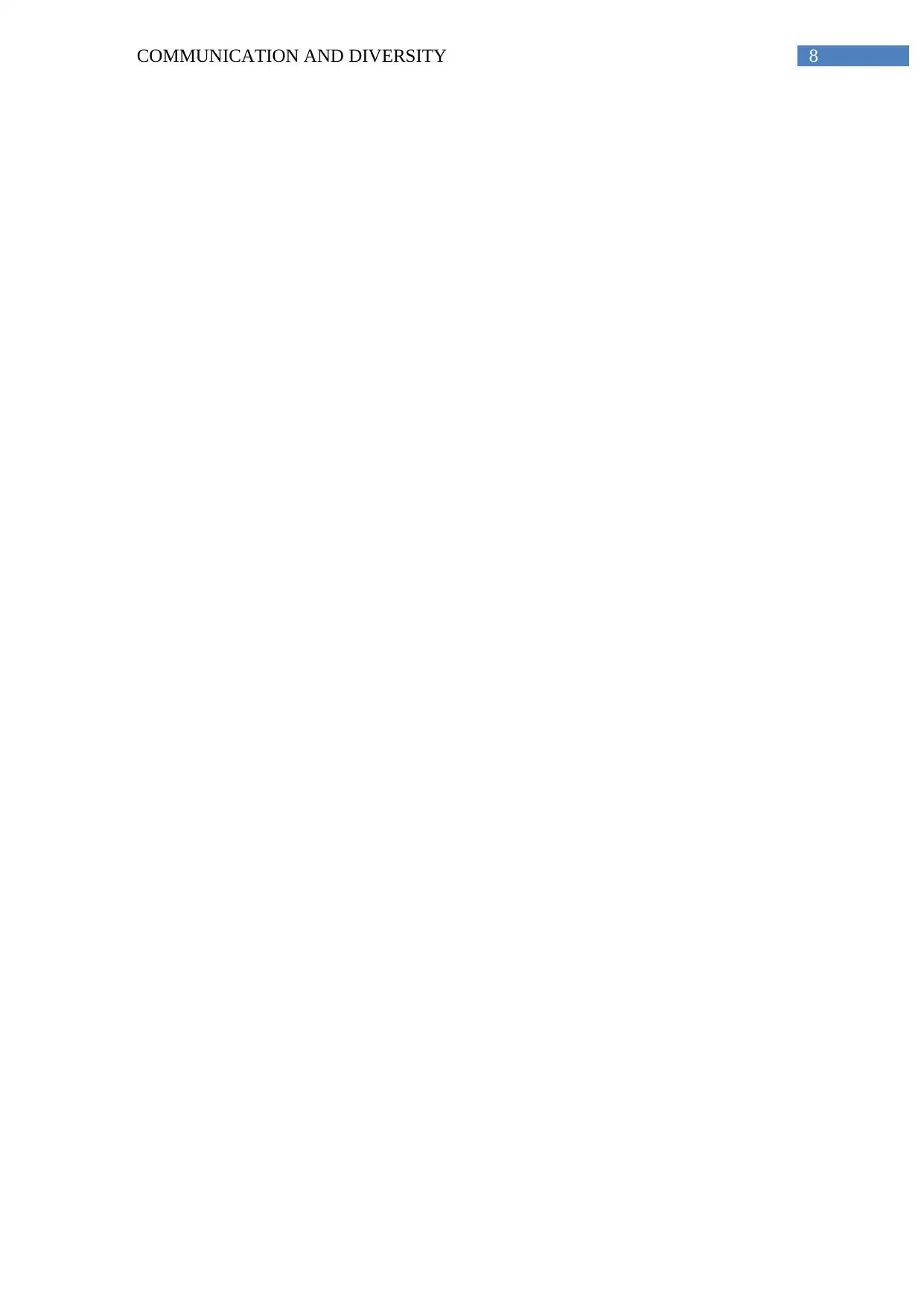
8COMMUNICATION AND DIVERSITY
⊘ This is a preview!⊘
Do you want full access?
Subscribe today to unlock all pages.

Trusted by 1+ million students worldwide
1 out of 9
Your All-in-One AI-Powered Toolkit for Academic Success.
+13062052269
info@desklib.com
Available 24*7 on WhatsApp / Email
![[object Object]](/_next/static/media/star-bottom.7253800d.svg)
Unlock your academic potential
Copyright © 2020–2025 A2Z Services. All Rights Reserved. Developed and managed by ZUCOL.
